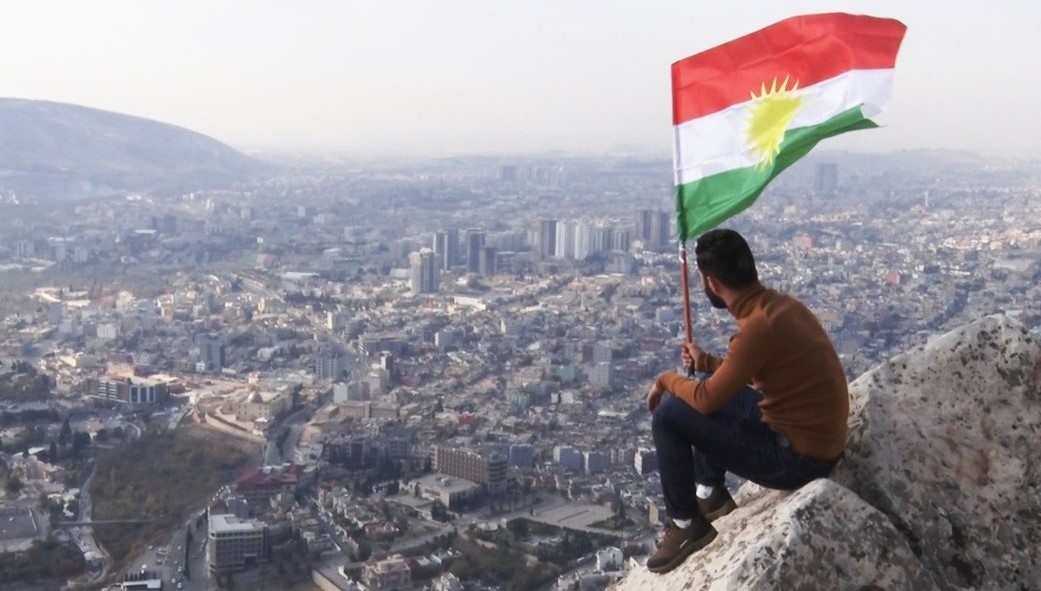
There is an old Kurdish saying, which in one sentence tells a truth so great as to be unbearable: ‘the Kurds have no friends but their mountains’. And the milestones of their history, marked by the betrayals they have suffered, stand there sadly to prove it. The recent crisis between Russia and Ukraine was yet another opportunity to bring their plight back to the fore, but in the worst way: Sweden and Finland have a seventy-year tradition of neutrality and have always argued that the best way to preserve peace was to spend on disarmament and diplomacy – for which Sweden has also progressively decreased its military spending.
All buried, the moment the tanks took the road to Kiev and massed on the shores opposite the island of Gøtland[1]. And now: even in these countries, where the Kurds were accepted, they took Ankara’s side and declared them all terrorists. In a slow process, which began in 2014, with the invasion of Crimea, Sweden decides to rearm[2] and strengthen a completely unarmed defence system[3]. The current crisis led the Scandinavian country, together with Finland, to take another important step: on 18 May 2022, the two countries submitted an official application to join the Atlantic Alliance[4].
The application is enthusiastically welcomed by NATO[5], but Turkey: ‘We will not say yes to those countries that apply sanctions on Turkey […] Neither country has a clear and unequivocal attitude towards terrorist organisations’[6]. The Turkish Foreign Minister, Mevlüt Çavuşoğlu, dictates the conditions for releasing the reservations by asking for ‘security guarantees’: a stop to the arms export embargo and an end to the alleged support – on Swedish and Finnish territory – of the Kurds of the PKK (the Kurdistan Workers’ Party) and the YPG (the Kurdish militia in northern Syria), which the president considers terrorist organisations: ‘Our position is perfectly open and clear. It is not a threat, it is not a negotiation in which we are trying to leverage our interests’[7].
President Erdoğan accuses Helsinki and Stockholm of being insensitive when it comes to terrorism, blaming them for not granting the extradition request of 30 terrorists in the past: “You do not hand over terrorists, but you want to join NATO. We cannot say yes to a security organisation without security”[8]. The reference is to members of the PKK, the Kurdish militia that has led an armed struggle against the Turkish state since the 1980s, in exile in Sweden. Erdoğan also accuses Stockholm of harbouring members of the FETÖ movement, an Islamic sect (headed by Fethullah Gulen, a Turkish preacher and businessman who has been living in exile in the United States since 1999[9]) responsible, according to Ankara, for the 2016 coup attempt that cost 241 dead and 2194 injured[10].
On 28 June, in Madrid, after a series of skirmishes, the parties signed a Memorandum of Understanding (MoU) [11] containing concrete commitments by Finland and Sweden to cooperate with Turkey in the areas of counter-terrorism, organised crime and national security threats – in return for the MoU, Turkey accepted the NATO candidacy of Sweden and Finland. Some points, however, are controversial: the Scandinavian countries, in point 4 of the MoU, reject the Turkish request to include FETÖ, PYD (Democratic Union Party) and YPG among terrorist organisations, but a little further on they state that ‘Finland and Sweden reject and condemn terrorism in the strongest terms, in all its forms and manifestations’ and ‘unequivocally condemn all terrorist organisations that perpetrate attacks against Turkey’[12].
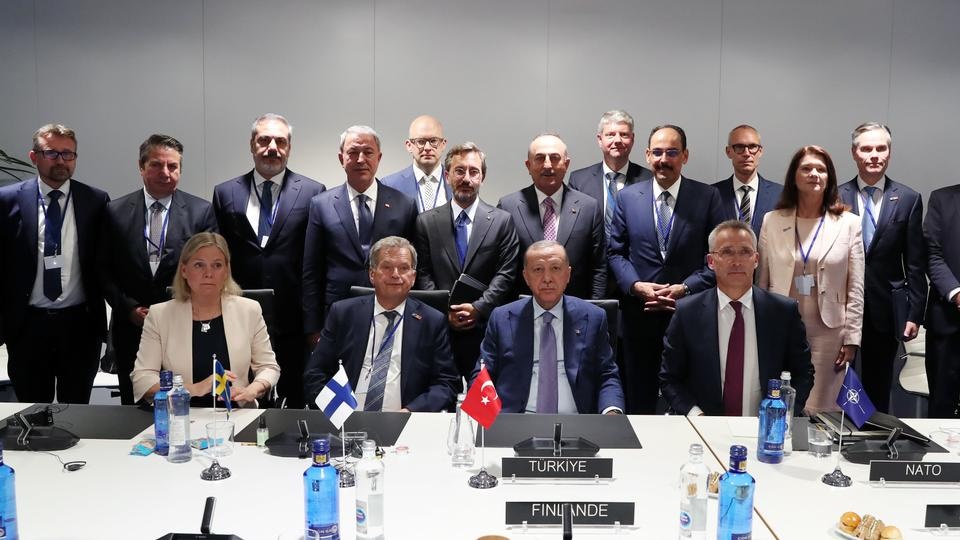
28 June 2022: Finland and Sweden sign memorandum of understanding with Turkey[13]
Paragraph 5 of the MoU seals the Scandinavians’ commitment to prevent, investigate, and repress any activity, including funding, related to all terrorist organisations and their extensions, as well as affiliates or groups or networks inspired by them[14]. These are very vague and dangerous statements, since this would prevent anyone from censoring and prosecuting legitimate organisations simply because they are considered suspicious or because they are ideologically opposed to Turkish power.
Point 8 talks about judicial cooperation regarding requests for the expulsion or extradition of suspected terrorists. These requests will be processed ‘swiftly and thoroughly’ by the Nordic countries, which will ‘take into account the information, evidence and intelligence provided by Turkey and establish the necessary bilateral legal frameworks to facilitate extradition and security cooperation with Turkey, in accordance with the European Convention on Extradition’[15]. not even a vague word on the defence of human rights and the protection of the rights of refugees – an issue that should be diriment.
It should be recalled that according to Article 3 of the European Convention on Extradition, extradition is not granted for political offences or when ‘a request for extradition has been made for an ordinary criminal offence for the purpose of prosecuting or punishing a person on account of his race, religion, nationality or political opinion, or that the position of that person may be prejudiced for any of these reasons’[16]. The problem is that most of the cases potentially covered by the MoU are highly political in nature. As Amnesty International denounces, Turkey too often uses anti-terrorist legislation as a weapon to repress the Kurds and to criminalise the peaceful exercise of freedom of expression[17]. This protocol allows Ankara to extend its unacceptable behaviour outside its jurisdictional area.
Swedish embarrassment
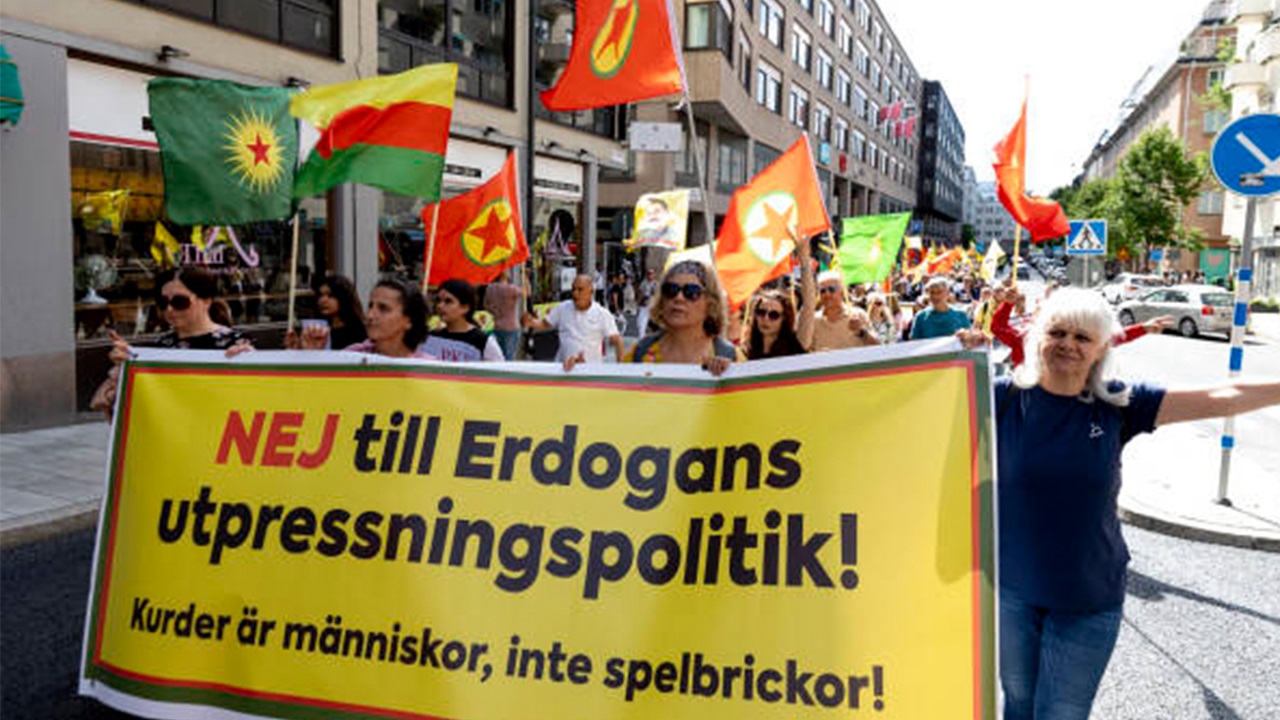
Thousands demonstrate in central Stockholm against the ‘anti-Kurdish pact’ with Turkey[18]
It is clear that Sweden and Finland have provided Erdoğan with a formidable foothold: in his sights are the Kurdish people, a thorn in Turkey’s side for decades[19]. Not only that. In June 2023, elections will be held in Turkey and the situation for Erdoğan is not at all rosy: inflation is soaring, the lira is plummeting, the polls for him are falling dramatically – he is rightly accused of being corrupt and incapable of managing the economy[20], and so foreign policy could be a lever to revive his popularity[21].
On 5 July 2022, in Brussels, the 30 members of the Atlantic Alliance signed the accession protocol for Sweden and Finland, allowing them to be present at almost all NATO meetings. All that is missing is ratification by parliamentarians – a process that takes several months, and here again Erdoğan raises his voice stating that the Turkish parliament will not ratify the applications of Sweden and Finland if they do not keep their promises: ‘Sweden has promised to give us those 73 terrorists’[22]. A promise never before revealed; not only that, Finland also seems to have promised the extradition of a dozen Kurds whom Ankara considers terrorists[23].
In Sweden, the backlash caused by the dissemination of the agreement on the extradition of the Kurds is heavy: thousands of demonstrators with the DKTM (Democratic Kurdish Community Centre) gather in the streets, protesting against the use of the Kurds as ‘bargaining chips to guarantee government interests’[24]. The president of the Kurdistan National Congress (KNK) Ahmed Karamus declares that the agreement is ‘very dirty’, and is contrary to both domestic law and humanitarian criteria – a ‘betrayal’ for the Kurds and for all Swedes[25]; parliamentarian Aminah Kakabaveh recalls that ‘Kurds have shown unique resistance against ISIS and have fought for the whole world’, and that she considers the agreement contrary to promises made by the West.
Daniel Riazat accuses: ‘every pact with Turkey brings death to the Kurds’[26]; Nooshi Dadgostar, leader of the Left Party, asks: ‘Will Sweden arm Turkey in its war against Syria? Which opponents of the regime will be extradited?”[27]. The Green Party calls on the Swedish Foreign Minister Ann Linde to appear before the parliament’s foreign affairs committee to explain what the government has conceded[28]; Shiyar Ali, the Swedish representative of the Kurdish regions of northern Syria, declares that Sweden has ‘lost its basic principles of democracy, human rights and freedom’ and its ‘reputation as a humane country and safe haven for those fleeing terrorism and oppression’[29].
Amid public outrage and in total embarrassment, Ann Linde is forced to lie, denying that her country has ‘bowed’ to Erdoğan’s will: ‘The Kurds have no reason to think that their human or democratic rights are at stake’[30]. Justice Minister Morgan Johansson states that any decisions regarding the possible extradition of terrorist suspects will be taken by ‘independent courts’[31]. Despite these reassurances, at five o’clock in the morning on Friday 19 August, Zinar Bozkurt, a 26-year-old Kurdish activist, was arrested, a week before Erdoğan’s visit to Stockholm[32]: he would be the first Kurd ready to be handed over into the hands of the president.
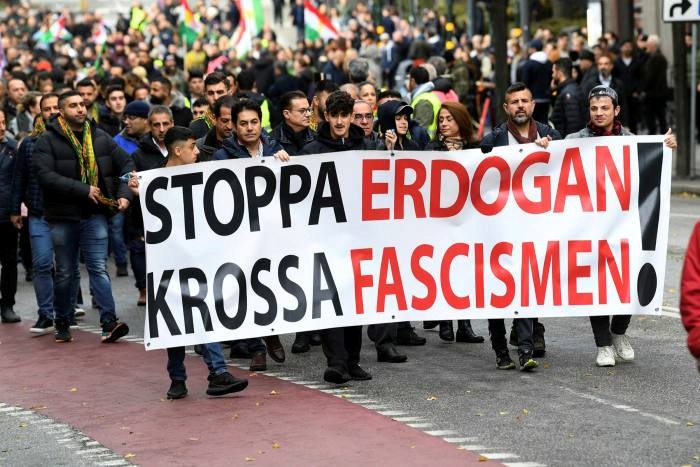
12 October 2019: Swedes on the streets to demand that Turkey stop the massacre of Kurds fighting ISIS troops[33]
In Sweden for eight years, Zinar is persecuted in Turkey because of his Kurdish identity, his homosexuality and his involvement in the HDP (People’s Democratic Party). His asylum application is rejected by the Swedish immigration office because he is considered to be linked to the PKK, which is now considered a terrorist organisation[34]. His lawyer appealed to the Court of Justice of the European Union as he considered this extradition warrant ‘illegal’[35]. Once deported to Turkey, Zinar risks torture and heavy imprisonment.
Meanwhile, the Swedish government wants to extradite Okan Kale, a man convicted of credit card fraud, who appeared on a list published by the Turkish media of people wanted by Ankara, but the Turkish government’s response is astonishing: we don’t know what to do with him, he is not on the regime’s list of enemies[36]. In Sweden alone, Kurds who have fled torture and murder in Turkey exceed 100,000, but the numbers of the Kurdish diaspora are enormously larger, affecting almost all western countries
The long trail of betrayals
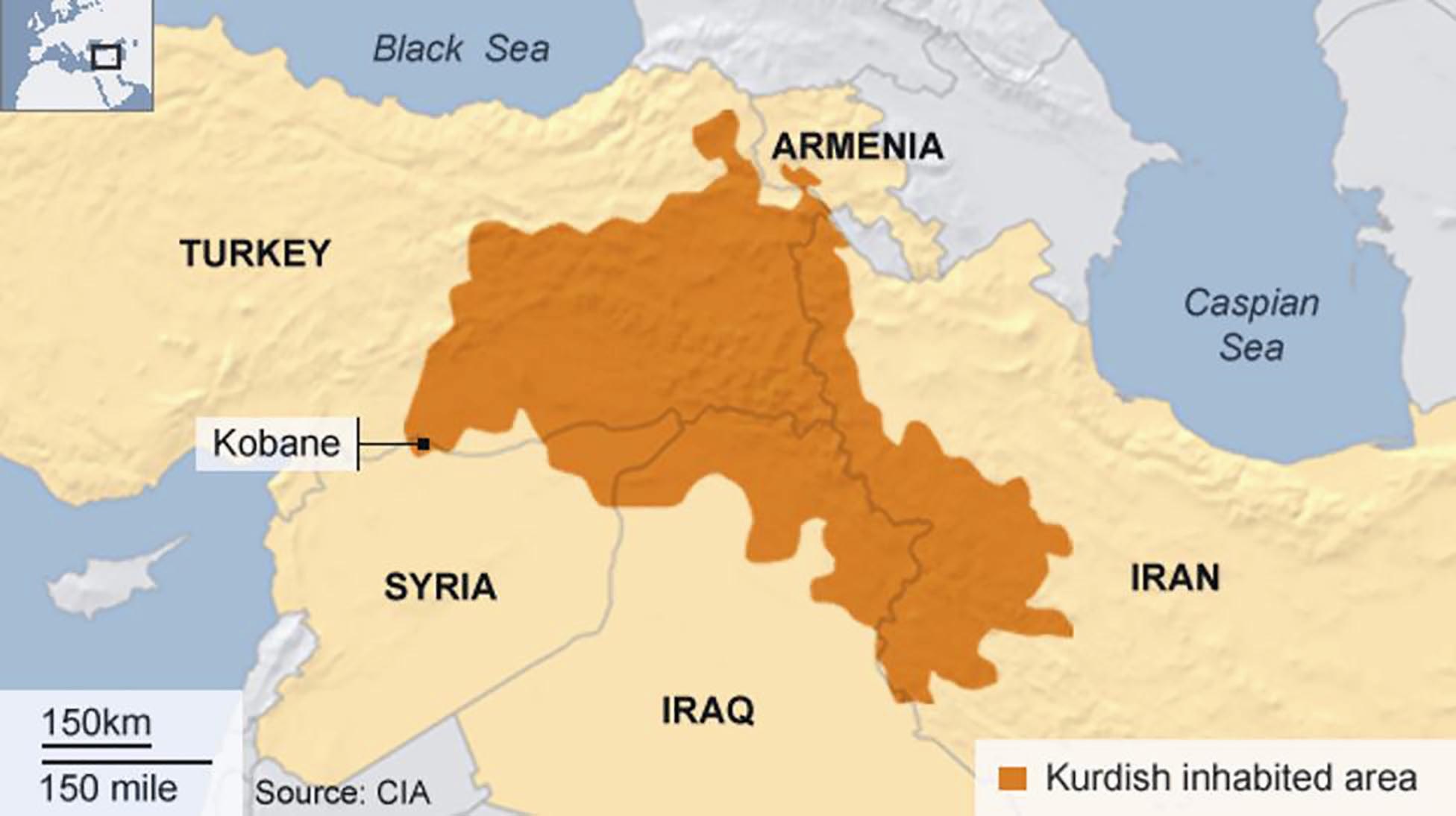
The Kurds live in an area straddling the borders of Turkey, Iraq, Syria, Iran and Armenia[37]
The Kurdish ethnic group is the largest in the world without a nation state: they are thought to be between 25 and 35 million, scattered throughout the Middle East, in an area of no less than 450,000 km2, straddling Turkey, Iraq, Syria, Iran and Armenia, within (imaginary) borders that delineate Kurdistan, erased by the military history of half a millennium. The Kurdish language is of Iranian stock, hence Indo-European. Today, new scientific research believes that Kurdistan was already inhabited by the same ethnic group as today in the Neolithic period, mainly in the fertile inverted crescent from the Caspian Sea to Syria[38].
Their conversion from Christianity to Islam took place in the 7th century, and today most Kurds are Sunni Muslims, mixed with Alevi, Christian, Jewish and Yazidi communities. In any case, in an area of strong fundamentalism, the Kurds are known as one of the few cultures that practice religious tolerance, and embrace modern values such as the recognition of women’s identity, secularism, ecological justice, and the centrality of rights to education and health.
Perhaps this is precisely why they are persecuted. Between the 16th and 18th centuries, vast portions of Kurdistan were systematically devastated and large numbers of Kurds deported to the farthest corners of the Safavid and Ottoman empires: such persecutions only served to ingrain in the Kurds a feeling of national belonging[39]. In 1867, the last autonomous Kurdish principalities were literally uprooted by the Ottomans and Persians who now ruled the whole of Kurdistan[40]. Since then, the world balance has changed many times, and each time the Kurds have hoped, and been disappointed – the persecution continues, fiercer than ever.
Six years after the end of the First World War, Turkey became the direct successor of the dissolved Ottoman Empire. In 1919, at the Paris Peace Conference, the Treaty of Sèvres guaranteed the Kurds the possibility of creating an independent state in the territories established by a commission of the then League of Nations. But Syria and Mesopotamia – today’s Iraq – became French and British protectorates, thus barring the way for a Kurdish state in those areas.
Things are no better in the north either: with the rise to power of Mustafa Kemal Atatürk, first president of the Republic of Turkey and extreme nationalist[41], Turkey forces the western powers to revise the terms of the Treaty of Sèvres and in 1923, with the Treaty of Lausanne[42], all concessions given to ethnic minorities, including the Kurds, are cancelled. The nation of Kurdistan is then divided, and its territories included in the neighbouring states Syria, Iran, Iraq and Turkey. Thus four different Kurdish regions are born, each with a different flag: this is the beginning of a very long struggle for the right to self-determination of Western Kurdistan from Syria, Eastern Kurdistan from Iran, Southern Kurdistan from Iraq, and Northern Kurdistan from Turkey.
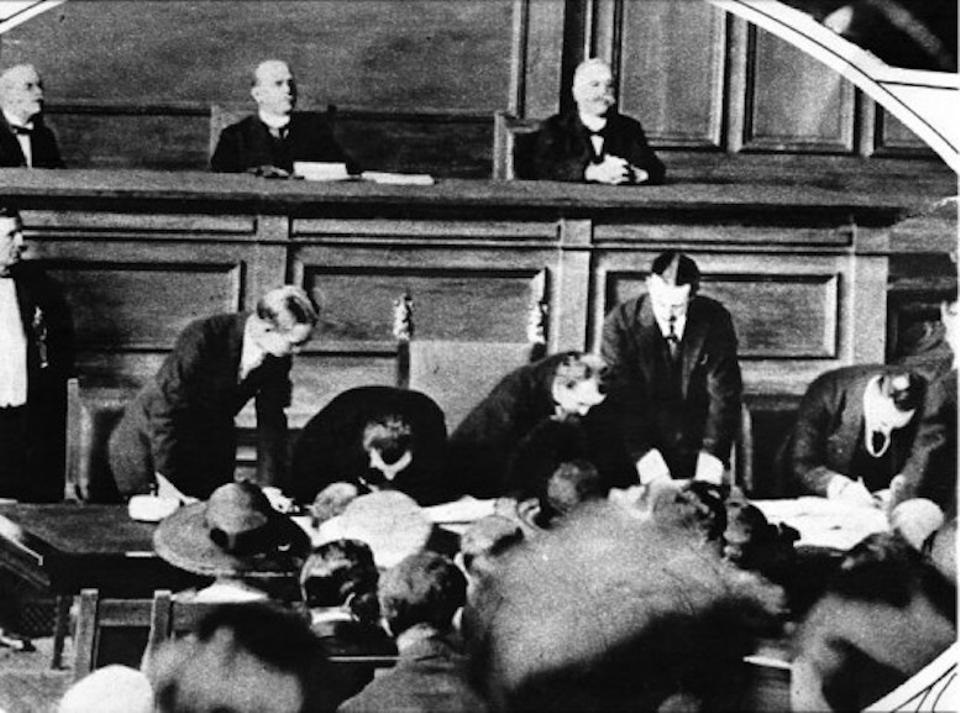
24 July 1923: The Turkish delegation, led by Foreign Minister Ismet Inonu, signs the Treaty of Lausanne, effectively cancelling the concessions made to the Kurds by the previous Treaty of Sèvres[43]
The existence of the Kurds, so different from the peoples of the Arab monarchies, is seen as a destabilising element, capable of undermining the national unity of the states in which they live – making them the target of hatred from surrounding countries. Between the 1930s and 1940s, the Kurdish rebellion, under the leadership of commander Mustafà Barzani[44], was mainly directed against the Iranian and Iraqi regimes. After the war, in January 1946, under the aegis of the Soviet Union, there is a new attempt to form a Kurdish state, the Republic of Mahabad[45], led by the Democratic Party of Iranian Kurdistan (KDP-I) with Qazi Muhammad at its head[46]. The Republic is autonomous and is located on the north-western border of Iran, but is in fact part of this state. This delicate balance collapses with the abandonment of the area by the Soviet Union, and the Republic of Mahabad, left to its own devices, is promptly recaptured by Iran just 11 months after its establishment[47]. The Kurds were betrayed again.
Following new broken promises, in 1961, under the government of Iraqi Prime Minister Abd al-Karim Qasim, Mustafa Barzani launched a rebellion that continued for a decade. In 1962, in the governorate of Al-Hasakah, home to the highest concentration of Kurds in Syria, a census was started by which all Kurds who could not prove their residence in Syria before 1945 were deprived of their citizenship. Over 120,000 Kurds become stateless and unable to travel; they and their descendants are also denied the right to vote, to own property or businesses, or to marry legally[48]. In a report published in 2005, Amnesty International stated that, due to natural population growth, the number of Kurds deprived of Syrian nationality ranged between 200,000 and 360,000 in that year[49]. In Iraq, Saddam Hussein’s Baath Party came to power and planned Kurdish autonomy. But those plans remain waste paper[50]. Yet another betrayal[51].
In 1974 yet another blow: considered as ‘unpatriotic and not loyal to their homeland’, the ‘Arab belt’ plan is implemented against them: agricultural land and villages along the Syrian-Turkish border strip – a strip about 250 km long and 15 km deep – are seized, and in their place Arab farmers brought from the governorates of Raqqa and Aleppo, evacuated from the lands submerged by Lake Assad, are settled; in less than six years, the Iraqi government evacuates a quarter of a million Kurdish men, women and children[52]: the project is aimed at completely destroying Kurdish identity and culture[53].
The genocide
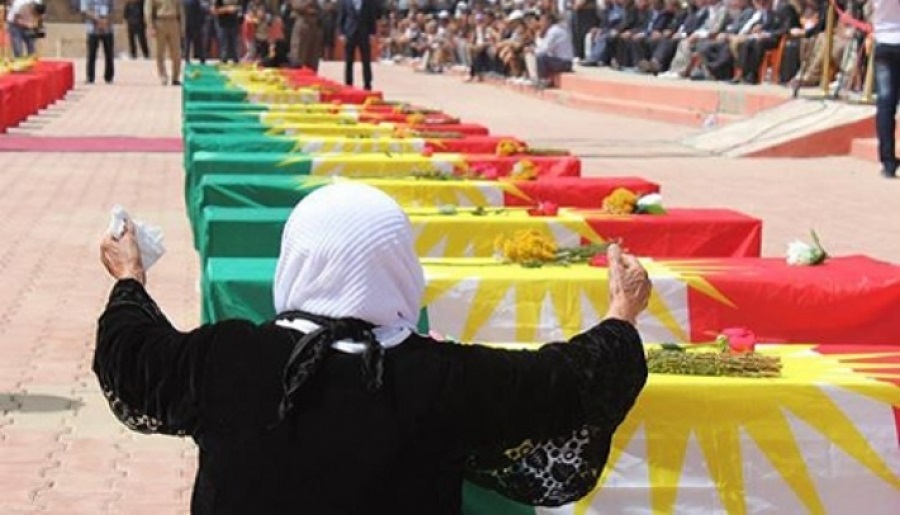
31 July 1983: Saddam Hussein launches the Anfal campaign: over 180,000 Kurds are killed[54]
1974 was the year of the birth of the PKK, the Kurdistan Workers’ Party, which sought to fuse Marxism with Kurdish nationalism, led by Abdullah Öcalan and with the goal of building an independent Kurdistan in south-east Turkey. The party quickly gains support, becomes the home of all those Kurds from whom civil rights have been taken away, but at the same time becomes Turkey’s number one enemy with whom it goes to war in 1984 – a war that has never ceased. The PKK was considered a terrorist organisation by Turkey[55], the USA[56] and the European Union[57].
On 12 September 1980, the army, led by General Kenan Evren, overthrew the democratic government[58]. The coup d’état is bloodless, but the unleashed masses on the streets take it out on the left and the Kurds[59]: 50 people are executed and about half a million arrested, many die from torture, thousands disappear[60]. A provisional constitution hands unlimited powers to the military, suspends civil liberties and political activity[61]. The spiral of repression towards the Kurds increases: the entire south-eastern part of Anatolia, the Turkish part of Kurdistan on the Syrian, Iraqi and Iranian borders, is occupied militarily. A large part of the population of the countryside is deported to the outskirts of the cities, many Kurds continue to be imprisoned and tortured: the brutal repression drives many of them to join the ranks of the PKK[62].
Towards the end of the Iran-Iraq war, from 23 February to 6 September 1988, the Baghdad government launches the Anfal campaign against the Kurds, under the direction of Ali Hassan al-Majid, cousin of Saddam Hussein, nicknamed ‘Chemical Ali’ because of his passion for chemical weapons: he is the one responsible, on 16 March, for an air raid with chemical weapons on Halabja and the surrounding villages[63]. Anfal’s campaign is a clear act of genocide, more than 100,000 Kurds are killed (182,000 according to some sources[64], many bodies will later be found in mass graves scattered all over Iraq[65]), thousands of villages are destroyed, causing the displacement of hundreds of thousands of people, men women and children end up victims of mass arrests, torture and disappearances[66].
Some of the Kurds settle in ‘collective settlements’, while others are deported to southern Iraq or flee to neighbouring states, particularly to Iran[67]. Iraqi Kurdistan is literally devastated. After the war for the liberation of Kuwait, large-scale uprisings against Saddam Hussein begin, supported by the United States[68]. The Kurds, taking advantage of the chaos and Iraqi military weakness, retake many of the areas they consider historically their property, including Kirkuk. But the US changes allies, and Iraq retaliates with thousands of assassinations[69]. The only response to Iraqi atrocities is to declare a ‘no-fly zone’ in northern Iraq, which will remain in force until the fall of Saddam Hussein[70].
It was not until October 1991 that the Iraqi government withdrew its troops and civilian administrators from the northern governorates of Dohuk, Sulaimaniyya and Arbil, thus granting autonomy to the Kurds in the area: they set up their own administration by initiating an alliance between the Kurdistan Democratic Party (KDP), led by Mas’ud Barzani, and the Patriotic Union of Kurdistan (PUK), led by Jalal Talabani, as well as a number of other smaller political parties[71]. This allows many Kurds to return home, although a large part of them continue to live in squalid refugee camps.
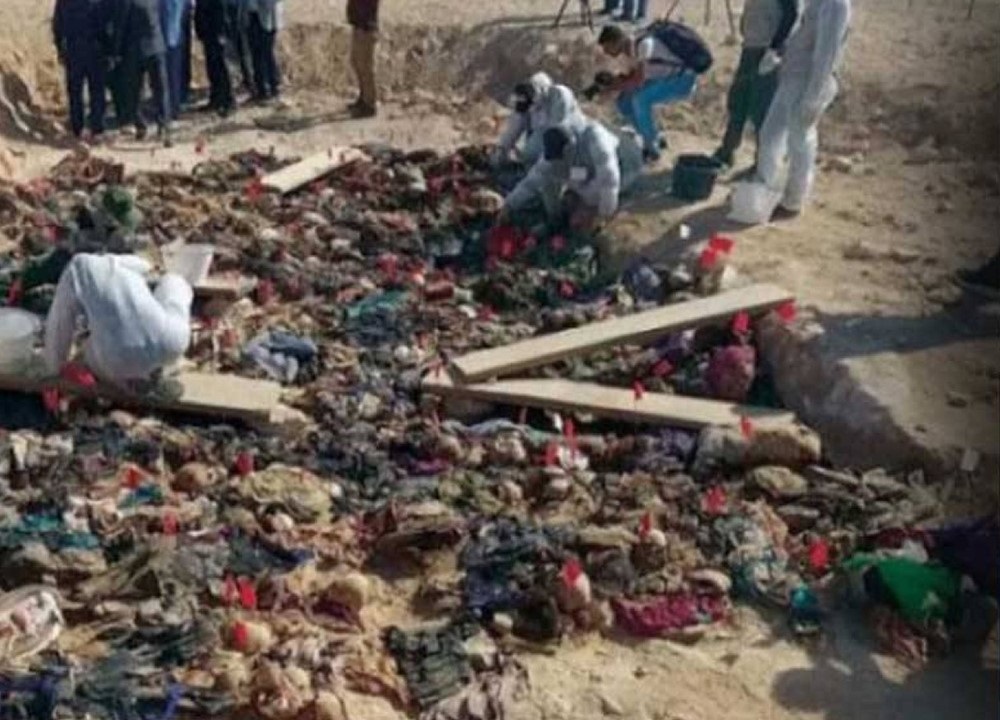
One of the many mass graves at Anfal – over 180,000 Kurds are buried there, mostly women and children[72]
Iraqi repression continued after the uprisings of 1991: two million Kurds fled to Iran, Turkey or the mountainous areas still under Kurdish control[73]; some districts of Kirkuk were razed to the ground and the government fought against Kurds and other minorities, refusing permission to the United Nations to monitor the area[74], which underwent a process of Arabisation: Kurds, Turcomans and Assyrians are forced to sign ‘ethnic identity correction’ (Tashih al-qawmiyya) forms, renouncing their ethnicity and officially registering as Arabs[75].
Abdullah Öcalan was arrested in Rome by the Digos in November 1998: Italy refused to extradite him to Turkey on the grounds that the death penalty is in force there, which created a diplomatic crisis between Ankara and Rome. In January 1999, Öcalan left Italy in search of protection, until he was escorted by the Greek secret services to the Hellenic embassy in Nairobi[76]. Here he was captured by Turkish special forces and sentenced to death for terrorism – a sentence later commuted to life imprisonment. Since then, Abdullah Öcalan has been locked up in solitary confinement on the prison island of İmrali, where only three other prisoners reside[77].
Yet another betrayal
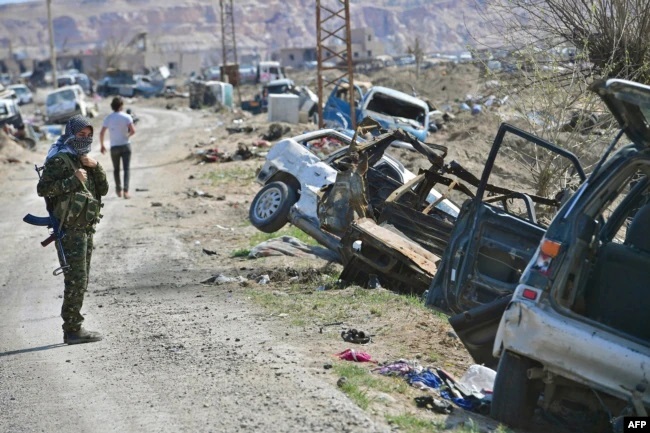
23 March 2019: US-backed Kurdish Syrian Democratic Forces (SDF) fighters walk through the eastern Syrian village of Baghouz after defeating the jihadist group[78]
On 20 March 2003, the United States went to war against Iraq, with the declared aim of overthrowing Saddam Hussein and fighting Islamic terrorism: the pretext, which later turned out to be totally invented, was the alleged possession by the Baathist regime of weapons of mass destruction[79]. The US special forces, stationed in Kurdish-controlled northern Iraq, demand and obtain close cooperation from the peshmerga forces (Kurdish military forces of the autonomous Kurdistan region of Iraq) of the KDP and the PUK[80]: the goal is achieved and, after the fall of Saddam Hussein, Kurdish autonomy is formalised, leading to the creation of the Kurdistan Regional Government, with US support for the PDK and the Patriotic Union of Kurdistan (UPK) through the Coalition Provisional Authority (CPA) [81].
During 2013, the fight by Al Qaeda allies explodes, especially in Syria: both YPG and PYD defend Western military positions. In 2014, the jihadists’ attacks also spread to Iraq and the peshmerga had the worst of it: Sinjar was besieged by ISIS[82], and Obama authorised Iraqi air strikes against the Islamic fighters[83] and sent weapons and logistical support to the peshmerga[84]. The YPG and PYD, which have been fighting for Kurdish autonomy for decades, also come to the rescue. In January 2015, after fighting that cost the lives of at least 1600 Kurds, the area of occupation was liberated[85]. The Kurds fought alongside several local Arab militias under the banner of the Alliance of Syrian Democratic Forces (SDF) and, aided by US airstrikes and weapons, drove ISIS out of tens of thousands of square kilometres of territory[86].
In October 2017, the SDF occupies the ISIS capital, Raqqa[87], and advances south-east into the neighbouring province of Deir al-Zour[88], the jihadists’ last major foothold in Syria – until, in March 2019, the SDF conquers the last pocket of resistance, around the village of Baghouz[89]. The war can be considered to be over, the caliphate is declared defeated, the time has now come for the great betrayal: on 6 October 2019, the White House, as part of an agreement between Donald Trump and President Erdoğan, announces a change of strategy in Syria: it withdraws its forces from the northeast of the country, where the Syrian Kurds, just a few months earlier so valuable in the victory against jihadism, are located. Turkey launches Operation Peace Source, taking control of Kurdish territories and establishing a kind of security zone between the Turkish border and the Syrian Kurds[90]. The United States, once again, dumps the Syrian Kurds after promising them friendship and protection, and leaves them at the mercy of the worst enemy.
After four days of fighting, the Kurds agree with President Bashar al-Assad to deploy the Syrian army along the northern border against the Turkish forces; Russia, Assad’s faithful ally, also sends its military to key points[91]. At this point, the United States, after the outraged reactions of the international community, but also of the Republican Party itself, against the abandonment of the Kurds[92], decided to convince Erdoğan to pause Turkey’s offensive to allow the YPG forces to withdraw from the Turkish ‘safe zone’: the ceasefire was maintained until 22 October with the completion of the withdrawal[93].
On the same day, Erdoğan and Vladimir Putin seal an agreement to end the offensive[94]: a) Turkish forces are allowed to remain in the 120 km long strip of territory conquered between Ras al-Ain and Tal Abyad; b) Russian and Syrian troops can take control of the rest of the border area ensuring the withdrawal of YPG fighters at least 30 km from the border; c) from 29 October 2019, Turkish and Russian troops can start joint patrols within a 10 km deep zone along the border.
Turkey, however, does not give up: Erdoğan starts a season of air and ground campaigns against targets in Iraqi Kurdistan[95]: Baghdad limits itself to criticism, the KRG (the Kurdistan Regional Government) laments the civilian casualties[96]. Operations follow one another[97]. On April 18, 2022, Ankara starts a massive series of air and artillery attacks, supported by the landing of special forces, in the PKK’s operational heartland in Iraq: by the end of July, the Turkish Defence Ministry estimates PKK casualties at 289 dead and 330 caves and bunkers destroyed[98].
The YPJ Fighters
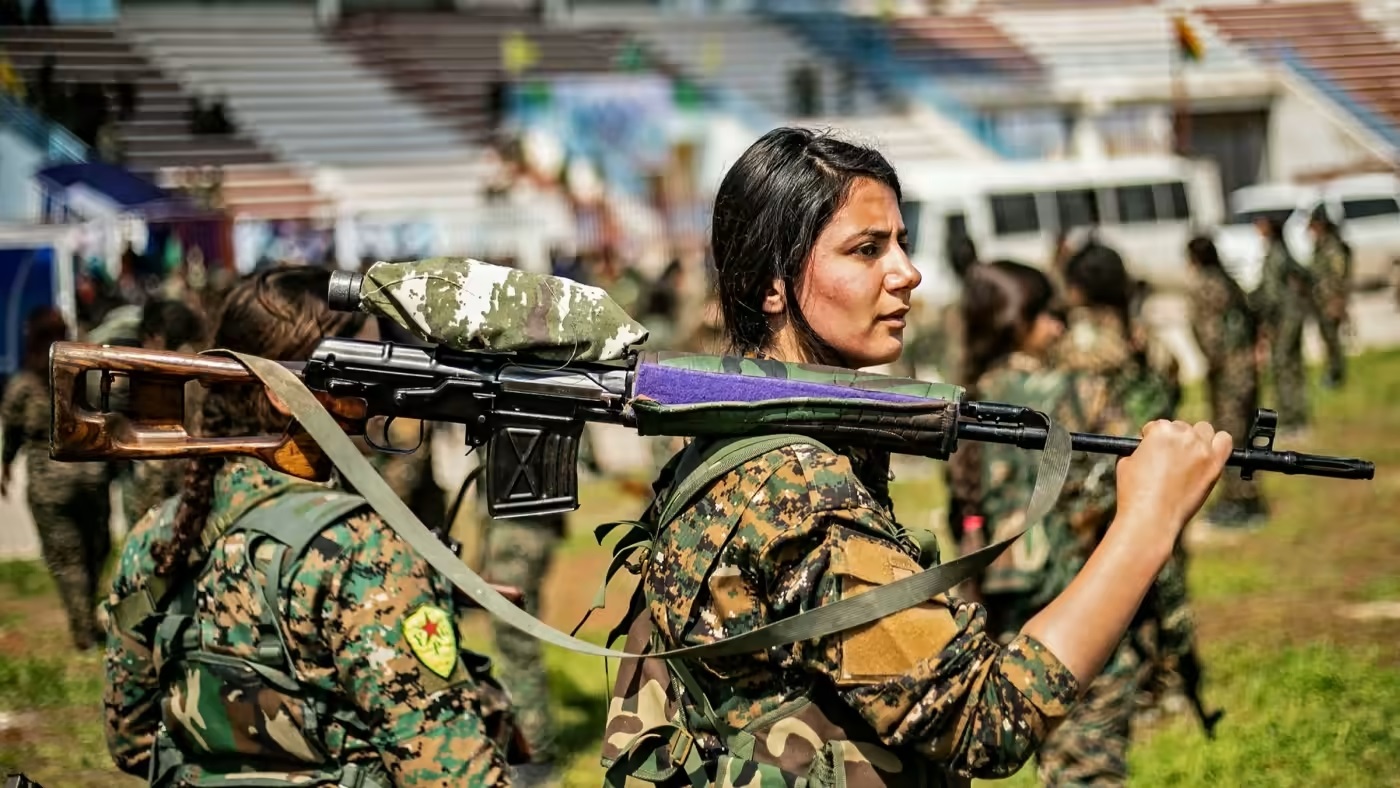
Fighters from the Kurdish Women’s Protection Units at a military parade in March 2019[99]
Kurdish women, as members of the PKK, first took up arms in the early 1990s. It is believed that 30% to 40% of the fighters are women, and that they enjoy high regard and respect among comrades of the opposite sex. Taking up arms is the result of a complex process, which originates from the desire of Kurdish women to free themselves from patriarchal constraints. A Syrian motto says: ‘ISIS jihadists are terrified of being killed by women, because they believe they will not go to paradise’[100]. In many parts of the Middle East, especially in Turkey, women are seen as reproductive tools, subservient to men, excluded from all decision-making. PKK leader Abdullah Öcalan, inspired by the American philosopher Murray Bookchin[101], has thus tried to empower his fellow women: ‘we can accurately describe the 5000-year history of civilisation as a rape culture’[102], says Öcalan, whose ideas are also embraced by the rest of the Kurdish leaders.
It is mainly thanks to the Kurdish leader, with his book ‘Kurdish Love’ in 1999, that a process of women’s emancipation is triggered. The PKK thus helps to provide them with political and military means to start a process of consciousness-raising and cultural development. Öcalan, despite being under arrest since 1999, manages to retain his leadership in the party thanks to the loyalty of the Women’s Protection Unit (YPJ). The YPJ became popular after the invasion of Syria by Islamic State militiamen: images of women wielding rifles in war actions, fighting alongside the YPG (People’s Protection Units), circulate around the world. To see women fighters in the Middle East is unthinkable for many, yet the Kurdish Women’s Protection Unit stands out for its determination and efficiency, to the point of attracting the participation of other non-Kurdish women from the rest of the world, as is also the case with the traditional PKK army[103].
On the front line, the YPJ fights fierce battles against ISIS, racking up victory after victory, earning a solid reputation in the West as well: French President François Holland, in 2015, did not hesitate to welcome Nasrin Abdullah, commander of the YPJ, to the Elysée Palace in her military uniform[104]. The most significant results are obtained in Rojava (the autonomous region in the north of Syria) where the Kurds have organised society on the principles of feminism, social ecology and libertarian municipalism, which takes the name of Democratic Confederalism[105]. The women of the YPJ thus became a world icon, a model to imitate, an example of how determination can profoundly affect the culture of a people, subverting ancient paradigms that seemed immortal.
An endless persecution
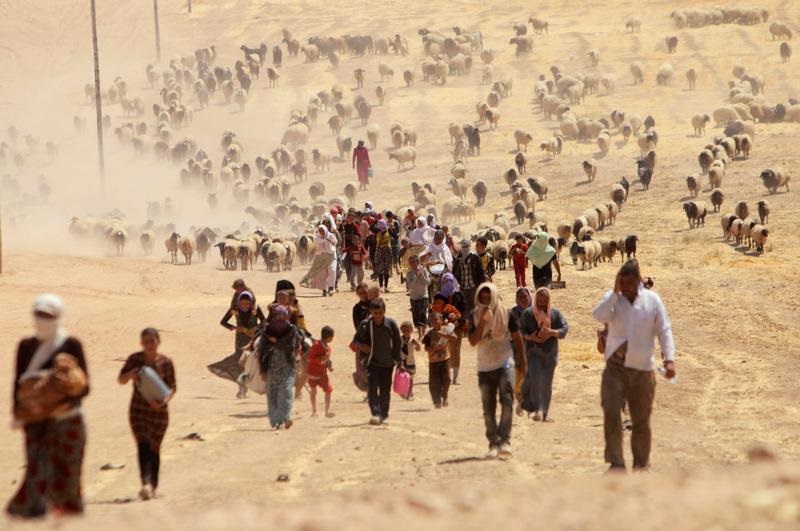
Years of persecution have forced millions of Kurds to leave Kurdistan[106]
To summarise in a few pages the complex millenary history of a people without committing omissions is obviously not possible: I have tried to paint in broad strokes the Turkish persecution, the atrocities suffered, the diaspora (it is estimated that Kurdish communities in Europe alone comprise between two and three million people, more than half of whom are in Germany[107]), my personal indignation at how this people, who have always defended the values of the West, have been treated by those (us) who should be its natural allies.
Just as Israel’s long-term goal is to wipe out the Palestinian people, so Turkey aims at the genocide of the Kurds. Who are alone, no one helps them, and perhaps that is also why they are so proud and so modern[108]. In the meantime, the government in Ankara fights at every level the part of the Kurdish population that resides in Turkey, even that part, affiliated to the HDP, that rejects armed struggle and calls for the integration of the Kurds in the land that hosts them. On 21 June 2021, the Constitutional Court charged the HDP with terrorism, called for a ban on political activity for 451 party members and the freezing of its bank accounts[109]. The trial is still ongoing, but we can expect anything. What is certain is that, in the event of an unfavourable outcome for the party, no one knows what could happen: without any public representation, the extermination of Turkey’s Kurds would continue without anyone abroad being able to perceive it. For what it is worth, since we have allowed Erdoğan to commit any crime with impunity.
The president, who is in the habit of torturing and killing his prisoners[110], shows Turkey’s democratic backwardness, despite the constitutional changes introduced in the 2000s as part of the EU accession process: Turkey’s constitution looks more and more like a container of broken promises[111], and the rest of the world has to take notice. This is not just a question of the disappearance of a people of millenary traditions, through no fault of their own. This is about accepting that someone, somewhere in the world, with our consent, is killing millions of people. World War II and the Holocaust have evidently taught us nothing.
[1] GØTLAND, DOVE COMINCIA LA NUOVA GUERRA MONDIALE | IBI World Italia
[2] https://www.government.se/globalassets/government/dokument/forsvarsdepartementet/sweden_defence_policy_2016_to_2020
[3] https://euromaidanpress.com/2015/03/22/gotland-the-danzig-of-our-time/
[4] https://www.theguardian.com/world/2022/may/17/finland-parliament-approve-nato-sweden-turkey
[5] https://www.nato.int/cps/en/natohq/opinions_195472.htm
[6] https://it.euronews.com/2022/05/16/veto-di-erdogan-no-finlandia-svezia-nella-nato-non-hanno-posizioni-chiare-su-terrorismo
[7] https://it.euronews.com/my-europe/2022/05/20/l-adesione-di-finlandia-e-svezia-alla-nato-il-si-turco-come-merce-di-scambio
[8] https://www.ft.com/content/3d1ab5d0-19a6-41bd-83a4-7c7b9e2be141
[9] https://www.aljazeera.com/news/2017/7/15/turkeys-failed-coup-attempt-all-you-need-to-know
[10] https://www.aljazeera.com/news/2017/7/15/turkeys-failed-coup-attempt-all-you-need-to-know
[11] https://www.nato.int/nato_static_fl2014/assets/pdf/2022/6/pdf/220628-trilat-memo.pdf
[12] https://www.nato.int/nato_static_fl2014/assets/pdf/2022/6/pdf/220628-trilat-memo.pdf
[13] https://www.trtworld.com/turkey/t%C3%BCrkiye-s-memorandum-with-sweden-finland-paves-way-for-nordic-nato-entry-58387
[14] https://www.nato.int/nato_static_fl2014/assets/pdf/2022/6/pdf/220628-trilat-memo.pdf
[15] https://www.nato.int/nato_static_fl2014/assets/pdf/2022/6/pdf/220628-trilat-memo.pdf
[16] https://rm.coe.int/1680064587
[17] https://www.amnesty.org/en/location/europe-and-central-asia/turkey/report-turkey/
[18] https://medyanews.net/protests-in-stockholm-against-trilateral-memorandum/
[19] COSÌ LA TURCHIA TORTURA E UCCIDE GLI INTELLETTUALI | IBI World Italia
[20] QUANDO IL CRIMINE SI FA STATO: LA TURCHIA DI KAMER E ERDOĞAN | IBI World Italia ; GEZI PARK: IL SIMBOLO DELLA TURCHIA AL COLLASSO | IBI World Italia
[21] https://www.tag43.it/erdogan-sondaggi-elezioni-presidenziali-turchia-inflazione-russia-ucraina-infrastrutture/
[22] https://www.rudaw.net/english/world/300620221
[23] https://www.euronews.com/2022/07/28/us-ukraine-crisis-nato-turkey
[24] https://anfturkce.com/avrupa/stockholm-de-binlerce-kisi-nato-daki-kurt-pazarligi-ni-protesto-etti-172797
[25] https://hawarnews.com/en/haber/swedes-demonstrate-against-decisions-of-nato-agreement-on-kurds-h31713.html
[26] https://anfturkce.com/avrupa/stockholm-de-binlerce-kisi-nato-daki-kurt-pazarligi-ni-protesto-etti-172797
[27] https://www.macaubusiness.com/relief-and-concern-in-sweden-after-nato-deal-with-turkey/
[28] https://www.macaubusiness.com/relief-and-concern-in-sweden-after-nato-deal-with-turkey/
[29] https://www.macaubusiness.com/relief-and-concern-in-sweden-after-nato-deal-with-turkey/
[30] https://medyanews.net/swedish-fm-linde-denies-bowing-down-to-erdogan-amid-protests/
[31] https://npasyria.com/en/79796/
[32] https://rojinfo.com/le-kcdk-e-appelle-la-suede-a-ne-pas-sacrifier-les-kurdes-a-la-turquie/
[33] https://www.ft.com/content/7defc9ce-d6d6-4485-94df-ca79eb37fa13
[34] https://www.lifegate.it/zinar-bozkurt-arrestato-curdo-svezia-attivista-curdo-turchia
[35] https://sparkchronicles.com/sweden-folds-to-erdogan-kurdish-activist-zinar-bozkurt-will-be-handed-over-to-turkey/
[36] https://www.dailysabah.com/politics/legislation/turkiye-expects-deportation-of-terror-suspects-not-other-crimes
[37] https://www.bbc.com/news/world-middle-east-29702440
[38] https://www.scirp.org/journal/paperinformation.aspx?paperid=19564
[39] https://kurdistanica.com/302/origin-of-the-kurds/
[40] https://kurdistanica.com/302/origin-of-the-kurds/
[41] https://www.britannica.com/biography/Kemal-Ataturk
[42] https://www.meer.com/en/62708-the-treaty-of-sevres-centenary
[43] https://www.middleeastmonitor.com/20200723-remembering-the-dissolution-of-the-ottoman-empire/
[44] https://www.britannica.com/biography/Mustafa-al-Barzani
[45] https://kurdishpeople.org/kurdistan-republic-mahabad/
[46] https://dckurd.org/2018/07/18/qazi-mohammed/
[47] https://newint.org/features/2020/06/11/100-years-hope-struggle-and-betrayal
[48] https://english.legal-agenda.com/kurds-of-syria-1962-2011-the-long-road-from-census-to-citizenship/
[49] https://english.legal-agenda.com/kurds-of-syria-1962-2011-the-long-road-from-census-to-citizenship/
[50] https://www.nytimes.com/1970/03/12/archives/iraq-recognizes-kurdish-autonomy.html
[51] https://www.cfr.org/timeline/kurds-quest-independence
[52] https://www.hrw.org/reports/2004/iraq0804/4.htm
[53] https://www.asocenter.org/node/786
[54] https://shafaq.com/en/Kurdistan/Kurdistan-recalls-Anfal-genocide
[55] https://www.mfa.gov.tr/pkk.en.mfa
[56] https://edition.cnn.com/2008/POLITICS/01/11/us.turkey/
[57] https://www.statewatch.org/news/2002/may/statewatch-news-online-eu-adds-the-pkk-to-list-of-terrorist-organisations/
[58] https://www.dailysabah.com/feature/2016/08/12/the-1980-coup-fearful-period-amid-political-crackdown
[59] https://www.union-communiste.org/it/1999-03/kurdistan-after-the-arrest-of-abdullah-ocalan-1058
[60] https://www.reuters.com/article/uk-turkey-trial-1980-idUKBRE8330F320120404
[61] https://www.reuters.com/article/uk-turkey-trial-1980-idUKBRE8330F320120404
[62] https://www.union-communiste.org/it/1999-03/kurdistan-after-the-arrest-of-abdullah-ocalan-1058
[63] https://shafaq.com/en/Kurdistan/Kurdistan-recalls-Anfal-genocide
[64] https://us.gov.krd/en/issues/anfal-campaign-and-kurdish-genocide/
[65] https://medyanews.net/the-anfal-massacres-and-genocide-179000-bodies-still-lie-buried-in-mass-graves/
[66] https://www.hrw.org/reports/1993/iraqanfal/ANFALINT.htm
[67] https://www.hrw.org/reports/1993/iraqanfal/ANFALINT.htm
[68] https://theintercept.com/2019/10/07/kurds-syria-turkey-trump-betrayal/
[69] https://www.hrw.org/reports/2004/iraq0804/4.htm
[70] https://www.hrw.org/reports/2004/iraq0804/4.htm
[71] https://www.hrw.org/reports/2004/iraq0804/4.htm
[72] https://www.ozgurpolitika.com/haberi-toplu-mezarlarda-hala-179-bin-kisi-var-148635
[73] https://www.refworld.org/pdfid/3ae6a62b4.pdf Chris Dammers, “Iraq” in Janie Hampton, Internally Displaced People: A Global Survey (Londra: Earthscan Publications, 1998), pp. 180-185
[74] https://books.google.it/books/about/Sanctioning_Saddam.html?id=oVNE_lJpOKoC&redir_esc=y Sarah-Graham-Brown, Sanctioning Saddam: The Politics of Intervention in Iraq (Londra e New York: IB Taurus, 1999), p. 40
[75] https://dckurd.org/wp-content/uploads/2021/04/Kirkuk-and-Its-Arabization-Historical-Background-and-Ongoing-Issues-in-the-Disputed-Territories.pdf “Kirkuk and its arabizaztion: Historical Background and Ongoing Issues in the Disputed Territories” – Washington Kurdish Institute
[76] https://www.fpri.org/article/1999/02/the-capture-of-abdullah-ocalan-and-the-future-of-counter-terrorism/
[77] https://www.fpri.org/article/1999/02/the-capture-of-abdullah-ocalan-and-the-future-of-counter-terrorism/
[78] https://edition.cnn.com/2019/03/05/middleeast/syria-baghouz-isis-fighters-surrender-intl/index.html
[79] https://www.washingtonpost.com/politics/2019/03/22/iraq-war-wmds-an-intelligence-failure-or-white-house-spin/
[80] https://diginole.lib.fsu.edu/islandora/object/fsu:175614
[81] https://it.gariwo.net/educazione/approfondimenti/questione-curda-23795.html
[82] https://www.bbc.com/news/world-middle-east-29702440
[83] https://www.france24.com/en/20140808-obama-authorises-air-strikes-iraq-isis-genocide
[84] https://www.ft.com/content/797f9abe-214c-11e4-a958-00144feabdc0
[85] https://www.airforcemag.com/article/the-siege-of-kobani/
[86] https://www.cbc.ca/news/world/kurdish-troops-retake-cities-in-syria-from-isis-1.3091682
[87] https://www.bbc.com/news/world-middle-east-40490058
[88] https://www.ypgrojava.org/SDF-advancing-in-Deir-al-Zour
[89] https://www.reuters.com/article/us-mideast-crisis-islamic-state-idUSKCN1QV0WB
[90] https://www.aljazeera.com/news/2019/11/8/turkeys-operation-peace-spring-in-northern-syria-one-month-on
[91] https://www.bbc.com/news/world-middle-east-49963649
[92] https://www.theglobalist.com/syria-turkey-kurds-donald-trump-recep-tayyip-erdogan/
[93] https://www.bbc.com/news/world-middle-east-49963649
[94] https://www.bbc.com/news/world-middle-east-49963649
[95] https://jamestown.org/program/claw-lock-an-assessment-of-turkish-counter-pkk-operations-in-northern-iraq-in-2022/
[96] https://www.cfr.org/timeline/kurds-quest-independence
[97] https://jamestown.org/program/claw-lock-an-assessment-of-turkish-counter-pkk-operations-in-northern-iraq-in-2022/
[98] https://jamestown.org/program/claw-lock-an-assessment-of-turkish-counter-pkk-operations-in-northern-iraq-in-2022/
[99] https://www.ft.com/content/9aca2a1f-a843-4270-835d-770ea370ddf5
[100] https://www.theweek.co.uk/60758/ypj-the-kurdish-feminists-fighting-islamic-state#ixzz3GjjLHvDw
[101] https://pulitzercenter.org/stories/bizarre-and-wonderful-murray-bookchin-eco-anarchist
[102] https://www.freeocalan.org/news/english/revolution-is-female
[103] https://greydynamics.com/the-womens-protection-units-all-female-armed-forces/ ; https://www.tandfonline.com/doi/full/10.1080/09546553.2020.1837118 ”Terrorism and Political Violence” – Goran Larsson – Routledge Taylor & Francis Group –
[104] https://www.kurdishinstitute.be/en/kurdish-women-commander-welcomed-by-french-president/
[105] https://sro.sussex.ac.uk/id/eprint/89349/5/__smbhome.uscs.susx.ac.uk_tjk30_Documents_Matin%20-%20DC%20and%20Societal%20Multiplicity%20-%20Final.pdf “Democratic confederalism and societal multiplicity: a sympathetic critique of Abdullah Öcalan’s State theory” – Matin, Kamran (2019)
[106] https://www.iraqicivilsociety.org/archives/6319
[107] https://www.washingtoninstitute.org/policy-analysis/nato-membership-sweden-between-turkey-and-kurds
[108] https://it.gariwo.net/educazione/approfondimenti/questione-curda-23795.html
[109] https://it.gariwo.net/educazione/approfondimenti/questione-curda-23795.html
[110] https://www.duvarenglish.com/51-prisoners-subjected-to-torture-5-died-last-month-in-turkey-report-news-60809
[111] https://www.hrw.org/world-report/2022/country-chapters/turkey
Leave a Reply